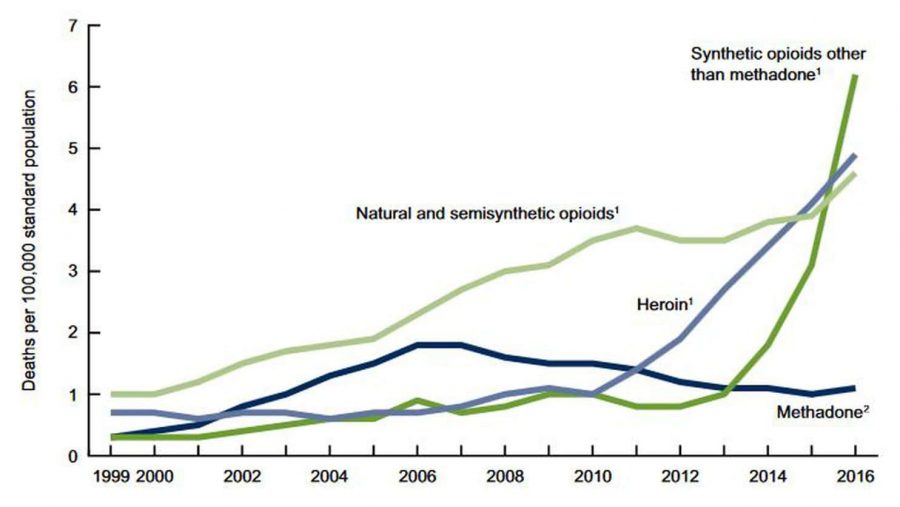Fueled by Drug Overdose, Average Life Expectancy in the US Declines
Centers for Disease Control and Prevention
Deaths due to drug addiction are on the rise in recent years.
For the second straight year, the average life expectancy at birth of a person living in the United States has declined, as stated by the Centers for Disease Control and Prevention (CDC) in the organization’s yearly report. The last decline in the United States was fueled by the AIDS crisis in 1993, but this recent decline is the first multi-year decline since the influenza outbreak affected the life expectancy rates for 1962 and 1963. This recent report on the two-year decline spans over the entirety of 2015 and 2016, so any complete data released about 2017 will not be reported on until December of 2018. Even with the extremely limited data that is available, officials say the situation does not look any better for the coming year.
So, what is the central cause of this alarming decline? The answer can be found in the dangerous 21% rise in death by drug overdose and continual use. This is extremely concerning because it means that the state of the opioid crisis in America is becoming worse than it ever has been, affecting more young and middle-aged Americans, specifically those aged between 25 and 54 years old. A staggering 42,000 Americans tragically died of opioid-related overdoses in 2016 alone, which is a significant 28% increase from 2015. In total, 63,632 people died from drug overdoses in 2016, a more than 11,000 person increase from 52,404 people
“It’s even worse than it looks,” Keith Humphries, an addiction specialist at Stanford University told The Washington Post. “We could easily be at 50,000 opioid deaths last year. This means that even if you ignored deaths from all other drugs, the opioid epidemic alone is deadlier than the AIDS epidemic at its peak.”
If officials know what the problem behind this alarming decline in life expectancy is, then how can this issue be fixed? Some believe that the solution starts in schools. Sophomore David Castillo stated, “Drug education needs to start with the education of young children. If teachers can properly show kids how damaging drugs are at an early age, they will probably stay away from these harmful substances.” Today, drug awareness programs in schools do not always work as they should, sometimes functioning as more of an introduction to drugs than a warning about them. Countless schools in the US do not even have drug awareness programs; just 35% of public schools and 13% of private schools have an active program. So, if schools push a more effective drug use prevention program, it could have a role in finally increasing the average life expectancy again. Chief Raymond Kovach of the Garfield Police Department in New Jersey addressed the issue on a parental level, telling The Washington Post, “If you aren’t talking about it with your child, then someone else is. We’re trying to get into the high school before they try anything.”
Another possible solution to preventing drug use and death by drug overdose is to crack down on possession of drugs and illegal means of obtaining drugs. According to the Drug Policy Alliance, the United States spends over $50 billion annually to cover expenses related to the war on drugs, and over 1.5 million arrests were made for the possession, use, selling, and production of drugs in 2016, with 84% of those arrests solely for possession of drugs. If the police and investigation units can continue to bust drug dealers and users at high rates, it may help to keep illegal drugs out of the hands of civilians and prevent overdoses from continual drug use.
While drug overdose was a major reason for the decline in life expectancy over the last two years, the data released by the CDC also found minor increases in deaths by suicide and Alzheimer’s disease. The rise in deaths by Alzheimer’s disease is likely due to more accurate diagnoses of the mysterious mental issue, while suicide rates likely shifted based on the current state of society and the amount of care for mental health treatments. So, although there are other contributing factors to this decline, none are as prominent in the increase in drug overdoses, which is an alarming issue that needs to be addressed.

















